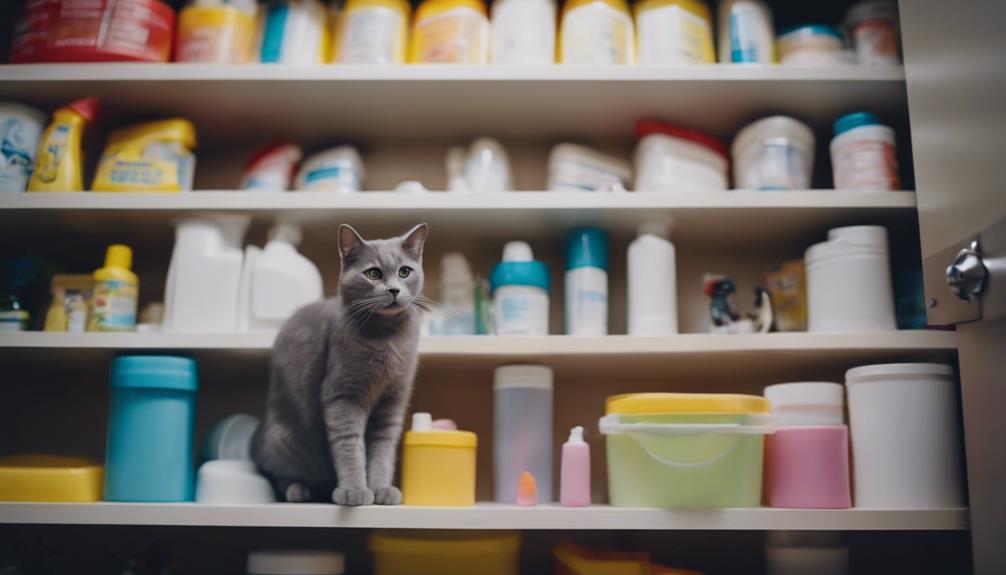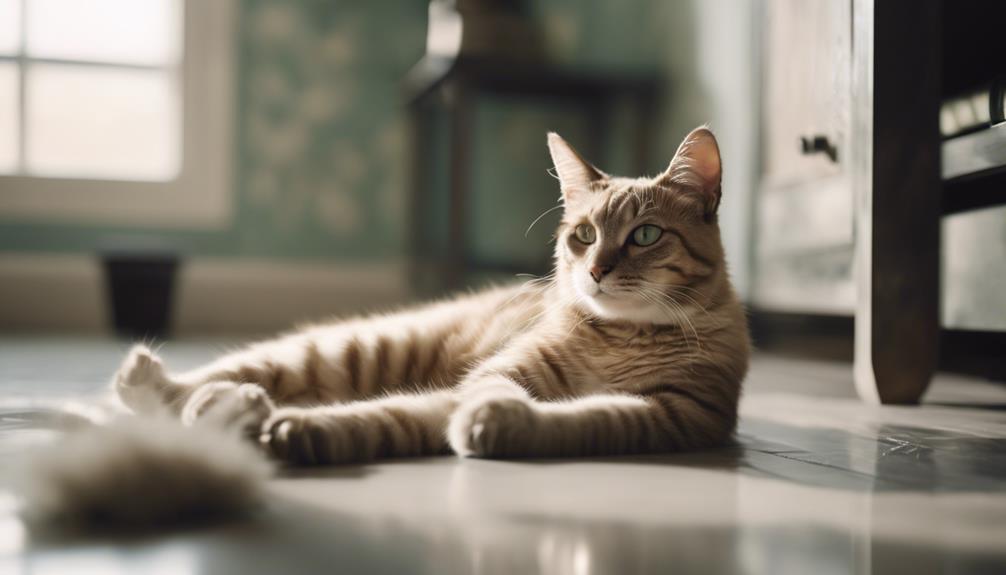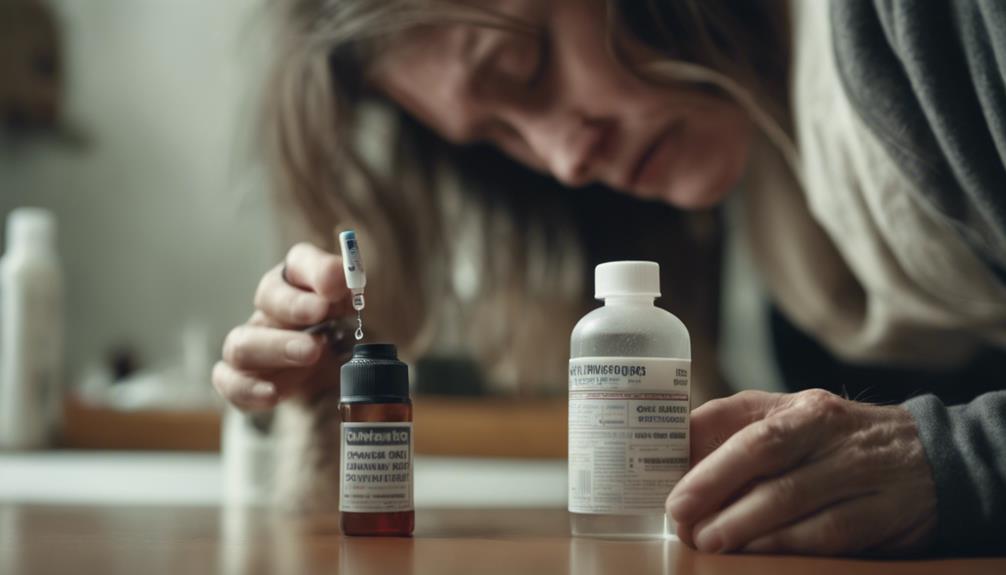Understanding the potential hazards that household cleaners can pose to our feline companions is a crucial aspect of responsible pet ownership. Cats, known for their grooming habits, are particularly vulnerable to chemical exposures from cleaning products.
By being mindful of the substances we use and implementing proactive measures to mitigate risks, pet owners can create a safe environment for their beloved cats.
This discussion will delve into practical tips and strategies for minimizing the dangers associated with household cleaners and ensuring the well-being of our furry friends.
Key Takeaways
- Safely store cleaners out of cats' reach to prevent accidental exposure.
- Keep cats away from wet areas during cleaning to avoid ingestion or skin contact.
- Dilute cleaners correctly, follow label instructions, and ensure surfaces are dry before reintroducing cats.
- Seek veterinary help if a cat shows symptoms of poisoning from household cleaners.
Understanding Cats' Sensitivity to Cleaners
With their heightened sensitivity to chemicals and toxins, cats can be significantly affected by household cleaners if proper precautions are not taken. Cats groom themselves regularly, making them susceptible to ingesting cleaning residues left on surfaces. Chemicals like ammonia and bleach, commonly found in household cleaners, can cause irritation to a cat's skin, eyes, and respiratory system.
Additionally, certain essential oils and phenols can be toxic to cats if ingested or inhaled. It's essential to be mindful of the products used around cats and ensure that they are stored securely to prevent accidental exposure.
Choosing Safe Cleaning Products
When selecting cleaning products for use in households with cats, prioritize those that are specifically formulated to be safe for feline companions. It's essential to choose products that won't harm your furry friends while keeping your home clean.
Here are some tips for selecting safe cleaning products:
- Look for cleaners labeled as pet-safe or non-toxic.
- Avoid products containing harsh chemicals like ammonia or formaldehyde.
- Opt for natural cleaners with ingredients like vinegar or baking soda.
- Consider unscented or lightly scented options to minimize potential irritants for cats.
Storing Cleaners Away From Cats

To prevent accidental exposure and ensure the safety of your feline companions, it is crucial to store household cleaners out of reach of cats. Cats are naturally curious and may investigate containers or bottles that are left accessible. Therefore, storing cleaners in high cabinets, secured closets, or cabinets with child-proof locks can help prevent cats from coming into contact with potentially harmful substances.
Additionally, consider organizing cleaning supplies in a designated area that is off-limits to cats, ensuring that all containers are tightly sealed. By taking these simple precautions, you can significantly reduce the risk of your cat being exposed to household cleaners and promote a safer environment for your beloved pet.
Preventing Exposure During Cleaning
Preventing exposure of cats to household cleaners during cleaning requires careful planning and implementation of safety measures. To ensure your feline friend stays safe while you clean, consider the following tips:
- Keep cats in a separate room during cleaning activities.
- Ensure proper ventilation to reduce fumes that may harm cats.
- Store cleaning products securely in cabinets or high shelves out of reach.
- Be mindful of where you place wet cleaning cloths or sponges to prevent accidental contact with cats.
Implementing Safe Cleaning Practices

Implementing safe cleaning practices around cats involves meticulous attention to detail and a proactive approach to minimize potential risks. When cleaning your home, ensure that your feline companion is safely secured in another room to prevent accidental exposure to harmful chemicals.
Store all cleaning products securely out of reach to avoid spills or ingestion. Dilute cleaners according to instructions and always keep lids tightly closed. Use sprays away from cats to prevent inhalation or skin contact. If your cat shows any signs of poisoning, such as vomiting or lethargy, seek immediate veterinary assistance.
Importance of Dilution and Ventilation
Proper dilution and adequate ventilation are pivotal factors in ensuring the safe use of household cleaners around cats. When cleaning your home, keeping these considerations in mind can help protect your feline friend from potential harm.
- Dilute cleaners according to instructions to minimize toxicity levels.
- Open windows or use fans to ensure proper airflow and reduce the concentration of fumes.
- Avoid using strong cleaners in enclosed spaces where ventilation may be limited.
- Consider using natural alternatives like vinegar or baking soda for a safer cleaning environment.
Acting Swiftly in Case of Ingestion

In the event of ingestion of household cleaners by your cat, what immediate steps should be taken to ensure their safety and well-being?
If your cat ingests a household cleaner, swift action is crucial. First, remove any remaining cleaner from your cat's fur or mouth. Then, contact your veterinarian or a pet poison helpline immediately. Be prepared to provide details on the cleaner ingested, its container, and the amount consumed. Do not induce vomiting unless instructed by a professional.
Keep your cat calm and monitor for symptoms like vomiting, drooling, or lethargy. Acting promptly can help minimize potential harm and ensure the best outcome for your beloved feline companion.
Frequently Asked Questions
Can Cats Develop Long-Term Health Issues From Repeated Exposure to Household Cleaners, Even if They Are Not Ingesting Them?
Repeated exposure to household cleaners, even without ingestion, can cause long-term health issues in cats. Inhalation and skin contact with chemicals may lead to respiratory problems, skin irritation, and potential organ damage. Safeguard cats by minimizing exposure and using pet-safe alternatives.
Are There Certain Types of Cleaners That Cats Are More Sensitive to Compared to Others?
Certain types of cleaners, like those containing phenols or essential oils, can be more harmful to cats due to their sensitivity. Caution should be exercised with these products, ensuring cats are kept away from exposure to prevent adverse reactions.
How Can I Safely Clean Surfaces That My Cat Frequently Comes Into Contact With, Such as Countertops or Floors?
To ensure surfaces frequented by cats are clean, use pet-safe cleaners or diluted solutions. Keep cats away during cleaning, store products securely, and follow label instructions meticulously. Seek veterinary help if ingestion occurs, prioritizing cat safety.
Are There Any Natural or Homemade Cleaning Solutions That Are Safe for Both Cats and Humans?
Natural and homemade cleaning solutions can be safe for both cats and humans. Vinegar, baking soda, and lemon juice are effective alternatives. Always test in inconspicuous areas first and avoid essential oils toxic to cats.
What Steps Can I Take to Ensure That My Cat Does Not Accidentally Come Into Contact With Cleaning Products While I Am Using Them?
To prevent accidental cat exposure to cleaning products, store them securely, keep cats away during cleaning, dilute products properly, and ensure surfaces are dry before reintroducing cats. Seek veterinary help if ingestion occurs or poisoning symptoms arise.
What Household Cleaners Could be Harmful to Cats with Congestive Heart Failure?
When dealing with cat congestive heart failure symptoms, it’s important to be mindful of the household cleaners you use. Avoid products containing bleach, ammonia, or phenols as they can be harmful to cats with congestive heart failure. Opt for pet-friendly, non-toxic cleaners to ensure the safety of your furry friend.
Conclusion
In conclusion, ensuring the safety of cats when using household cleaners is essential in maintaining their well-being. Understanding their sensitivity to certain cleaning products, choosing safe alternatives, and implementing protective measures are crucial steps in safeguarding their health.
By practicing safe cleaning habits, such as dilution and ventilation, pet owners can create a safe environment for their feline companions. Acting swiftly in case of ingestion is also important to prevent any potential harm to cats.




